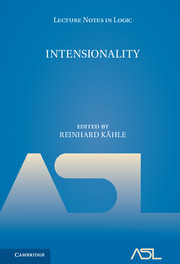Book contents
- Frontmatter
- Preface
- Contents
- The modal aether
- Possible worlds semantics for predicates
- A context principle
- The semantics of modal predicate logic II. Modal individuals revisited
- Intensionality and coercion
- Intensionality in philosophy andmetamathematics
- Representation theorem for models of dynamic intensional logic
- Intension, intention
- Modality, mood, and descriptions
- Coercion vs. indeterminacy in opaque verbs
- References
Representation theorem for models of dynamic intensional logic
Published online by Cambridge University Press: 30 March 2017
- Frontmatter
- Preface
- Contents
- The modal aether
- Possible worlds semantics for predicates
- A context principle
- The semantics of modal predicate logic II. Modal individuals revisited
- Intensionality and coercion
- Intensionality in philosophy andmetamathematics
- Representation theorem for models of dynamic intensional logic
- Intension, intention
- Modality, mood, and descriptions
- Coercion vs. indeterminacy in opaque verbs
- References
Summary
Abstract. In this paper the representation theorem for the class of models of dynamic intensional logic is established. It relies on a particular universal construction resulting from a new axiomatization of the class of models considered.
Introduction. The motivation for the present paper has arisen from a talk given by M. Stokhof on Dynamic Montague Grammar. In the early nineties this has become a hot topic dealing with a dynamic interpretation of natural language, yielding among others an adequate interpretation of anaphoric relations between quantificational expressions and pronouns ([5], [6]). However, we have been not exploring the subject as a whole. We have primarily been interested in the logical setting used to accomplish their linguistic task. The logical setting itself consists of:
(I) a formal language, called dynamic intensional logic (DIL), including a distinguished non-empty set of discourse markers;
(II) a class of DIL models;
(III) an interpretation of DIL terms with respect to a given DIL model, state and assignment of values to variables.
(I), (II) and (III) represent a dynamic extension of the respective static counterparts of intensional logic IL as formulated by Gallin [4] (see appendix A). This introductory part is basically aimed at pointing out the additional dynamic components (see [5]). Nevertheless, a full definition of the class of IL models will be given since it is also a building stone for our equivalent axiomatization of the class of DIL models in Section 2. It will also be seen that the latter enables a natural universal construction of a DIL model that finally results in the representation theorem for the class of DIL models.
Information
- Type
- Chapter
- Information
- Intensionality , pp. 160 - 173Publisher: Cambridge University PressPrint publication year: 2005
